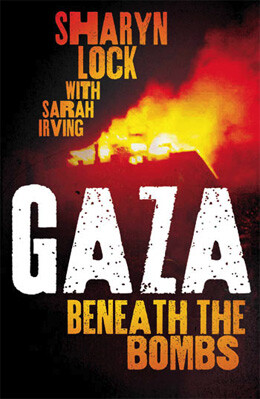The Electronic Intifada 30 December 2009

Originally from Australia but now living in the UK, Lock has worked in Palestine with the International Solidarity Movement (ISM) since 2002 when she shot by an Israeli soldier in the stomach. After being refused entry into Palestine from 2005 to 2006, Lock finally made it back to Gaza on the first “Break the Siege” boat sponsored by the Free Gaza Movement. She was in the Gaza Strip during Israel’s 22-day invasion last winter and her blog “Tales to Tell” documented the daily events she witnessed during the conflict not only with humanity but also humor. These posts have recently been published in the short book Gaza: Beneath the Bombs. The following is an edited interview with Lock about her experience in Gaza and why she feels privileged to have spent time with Palestinians there.
Arwa Aburawa: Why did you decide to stay during the attacks?
Sharyn Lock: With the announcement from Israel for internationals to leave, we assumed — correctly, as it turned out — that this was the start of the land incursion which followed the air attacks which had become regular. ISM were there mainly because of the isolation and the dreadful siege and so at a time when Israel wanted to isolate the Palestinians more, we made a decision that we didn’t want to leave. Also the fact that Israel wanted internationals to leave made us think, well, what is it you don’t want us to see, what is it you don’t want us to document? Whatever that is we want to be here for it.
AA: Did you realize at the time that you were one of very voices few coming from Gaza?
SL: It took a while for me to realize that I was seeing things that nobody else was seeing and that I needed to write them down. We didn’t have anyone telling us what to do and so we just got in the middle of things and were able to able to document them. It was up-to-the-minute reporting and I would try to get to a computer at the end of every day so that what I wrote would have been what I’d seen in the last hours. And once again, it was the least that we could do and it was really encouraging that people used it and responded to it by holding vigils and taking action based on the information that we were getting out to them.
AA: As your book is focused on the war in Gaza, was it hard to talk about anything but the suffering?
SL: It was important for me to portray the humanity and not just the suffering because that is the [story of the] Palestinians. That’s why I go, that’s why it’s a privilege to be there and to spend time with these people who just face something that we would just be crushed by, with courage and determination to keep hold of the things that they value. Basically, that’s what’s made it all possible and worthwhile, the negative experiences were totally outweighed by the positive experiences. That’s not to say that if you’re Palestinian, you wouldn’t want to get the hell out of somewhere where you have to battle to just exist, but people do it with courage and grace and manage to find humor. I guess that’s one of the ways that they survive.
AA: Did any of the events you witness and write about truly shock you?
SL: I am not sure if I can answer that question as all the things that happen all across the world seem to be near me, in front of me and I’m a witness to them even if I am not there. So, I tend to live in this state of mind and so nothing surprises me. Like the fact that civilians were so targeted in these attacks, that’s been Israeli policy for a long time and nothing stops them. And so when people were saying “this is horrifying, this is shocking,” it’s only a continuation of a policy that has existed for a long time.
There was one particular image which stunned people and that was of the baby that some of my medic colleagues retrieved which had been burned and chewed out by probably Israeli army dogs. And that’s a terrible image of something to happen to a child. But I wasn’t shocked by what I saw because that’s what this occupation is and it’s what we currently accept is going on. Also when these things get written up as evidence of war crimes, I do get a little confused as I’m thinking, “well, this was happening at the time and you’re speaking about war crimes now?” I just wish we realized things at the point at which we could try and stop them.
AA: What do you hope for the future of Gaza?
SL: I want to see the occupation end, I want to see the siege end. Weirdly, there was a CIA report that came out when I was there that predicted that in 20 years there would be one state for what is now Israel and Palestine. I feel like that’s what I want to hope for and certainly the Palestinians that I have spoken to have said that that’s what they hope for. Some Palestinians have said to me, “I don’t care whether it’s one state or two states, I just want to be on what’s historically our land, in peace, with equal rights to whoever is living with us and we don’t mind who that is.” There isn’t a sense that it’s us against them, they just want there to be justice for all.
Arwa Aburawa (http://arwafreelance.wordpress.com/) is a freelance journalist based in the UK.
Related Links
- Purchase Gaza: Beneath the Bombs on Amazon.com





